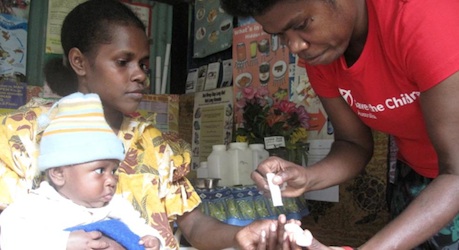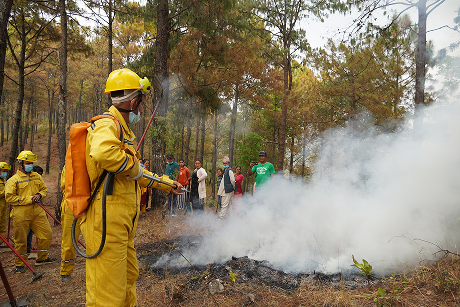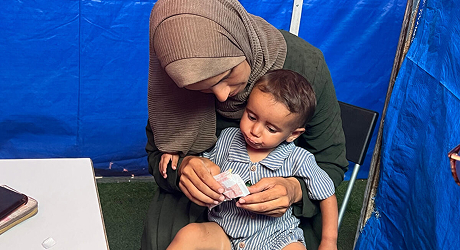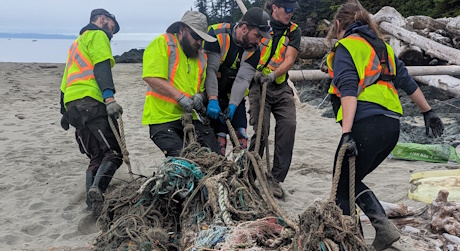Footprints Project
Since 2005, travelers like you have helped us change the world through micro-donations.

-
A total of
73
Travelers
-
donated
$25003.47
(100% funded) -
to help improve
Health
-
impacting
3000
people -
in
Vanuatu
Project overview:
Save the Children has devised a mobile phone tool which uses SMS (Short message service or text messaging) technology to assist Village Health Workers (VHWs) in their planning and delivery of community health education and basic health care services across remote locations. The system enables Save the Children to better monitor and support remote Village Health Workers to deliver quality health services in real time.
Village Health Workers feed information through SMS, responding to surveys about treatments, common illnesses treated at the Aid Post and community based activities conducted by Village Health Workers.
Project Activities:
Phone handsets were distributed to Village Health Workers in the project locations and a series of training activities were conducted. The 50 VHWs were given practical training in mobile phone usage as some participants did not know how to use a mobile phone. Training in SMS technology was also delivered.
Prior to the system ‘going live’, 34 Village Health Workers each received 8-12 hours of more detailed, hands-on training in the use of the SMS project tool which was a practical training around the use of the surveys.
Since ‘going live’ in August 2012, the Project Team has been monitoring SMS data coming in from Village Health Workers in the field, and regularly supporting them to trouble-shoot user-generated issues.
The information collected will ultimately be used to inform the levels of support that Village Health Workers will need in the future. Village Health Workers have varying capacities – through this system, Save the Children can identify when up-skilling of individuals is necessary via analysis of survey responses and identifying when a VHW is treating an illness incorrectly.
Information collected will be shared with Ministry of Health counterparts to support supervisory visits to VHWs in the field.

Photo: Polycap Teviri (a Village Health Worker Program Northern Coordinator) trains Village Health Workers from Malo Island on the use of the SMS tool.
Trouble-shooting:
A number of issues were experienced during the initial months of the project, primarily stemming from
- VHWs limited experience with SMS technology (causing non-completion of the surveys.)
- irregular disruptions to mobile phone service coverage (causing disruption of the system and delivery of surveys.)
These problems were addressed through regular engagement with VHWs and service providers. Increased user rates and quality of data have been evident in recent months. To further increase usage, another training session will be conducted. During this training, users will be surveyed to determine obstacles to usage.
Preliminary results:
The SMS tool has provided Save the Children with definitive information on the types and numbers of community health awareness activities being conducted by VHWs in remote locations, and of the number of community members participating in such activities.
For example, in the first three months of data collection, more than 120 people from rural communities have participated in, and been exposed to health promotion messages and activities relating to breastfeeding, non-communicable diseases, personal hygiene, family planning, tuberculosis and malaria, delivered by Village Health Workers during 13 community awareness activities.
Similarly, preliminary data has enabled Save the Children to identify which communities are actively supporting their Village Health Worker to operate from their Aid Post, and to review (and map) the most common illnesses being treated in the project locations, which will ultimately inform the development and delivery of refresher training for Village Health Workers.
Next steps:
- Send out monthly information statements to all VHWs participating in the pilot (whether active or not), which will provide a summary of the data being collected, its importance, and further encouragement to use the service.
- Additional refresher training with pockets of Village Health Workers in Sanma province, including surveys about obstructions to usage. Feedback will inform future support for VHWs to access the system.
- Continue to follow-up with individual Village Health Workers whose surveys drop out.
- A final pilot project evaluation will take place towards the end of the 12 month pilot project in August 2013. A detailed report will be devised with recommendations for scaling-up the use of the SMS tool to improve data collection from, and support to Village Health Workers throughout Vanuatu.

Photo: Village Health Workers from Malo Island celebrate the completion of their training in the use of the SMS tool.
Traveling soon? When you buy travel insurance with us, you can make a contribution towards a cause you care about.
Get a quote






